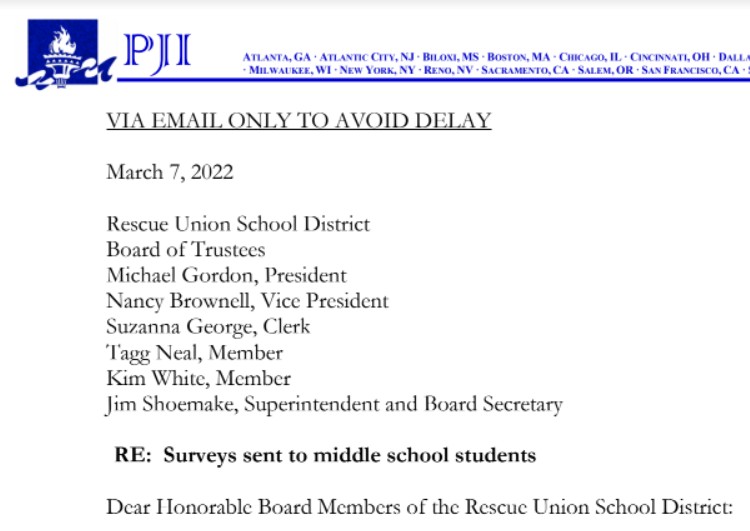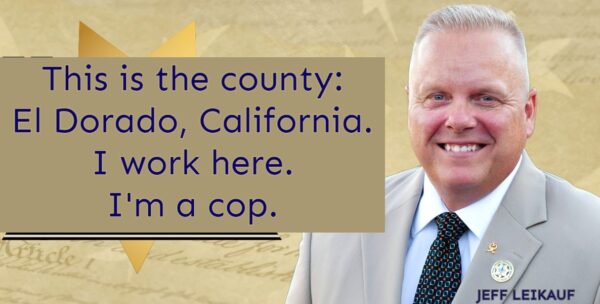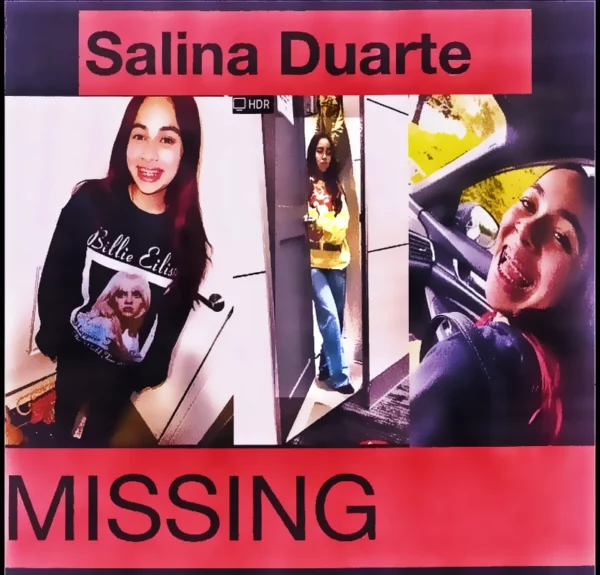
Rescue School District Notified
[Matthew McReynolds, Senior Staff Attorney, PACIFIC JUSTICE INSTITUTE]
March 7, 2022
Rescue Union School District
Board of Trustees
Michael Gordon, President
Nancy Brownell, Vice President
Suzanna George, Clerk
Tagg Neal, Member
Kim White, Member
Jim Shoemake, Superintendent and Board Secretary
RE: Surveys sent to middle school students
Dear Honorable Board Members of the Rescue Union School District:
Our firm has been contacted by several parents and members of the RUSD community who are gravely concerned about the legality and lack of parental notification that preceded dissemination of a survey to students at Marina Village Middle School. You undoubtedly have been made aware of at least some aspects of this survey, since it has generated substantial controversy. We are writing to ensure that you are apprised of legal issues involved and are taking all appropriate steps to prevent a repeat of this unfortunate incident.
By way of introduction, the Pacific Justice Institute has been advising and representing parents in these types of conflicts, as well as in defense of similar religious and civil rights, for the past 25 years. From our beginnings in Northern California we now have staff attorneys and offices across the United States.
Background
We have reviewed the contents of the survey sent to middle schoolers at MVMS on or about February 18, 2022, as well as general responses sent by school administrators to outraged parents. The parents’ concerns are understandable, as is their dissatisfaction with the vague expressions of regret.
Among other questions, these students—some of whom are preteens and many of whom are not yet sexually active—were asked in a suggestive manner whether they wanted to be regarded as having a variety of sexual orientations and gender identities.
For instance, it was suggested to the young students in this survey that they might be bisexual or pansexual, the latter being an especially loaded term with which many adults remain unfamiliar. The list of suggested pronouns offered to students for self- identification was equally confusing. While it has become less rare in some communities for individuals to identify as the opposite sex, the survey suggested highly inventive terminology and supposed pronouns that would leave most adults bewildered. Among these were supposed pronouns such as e-ex/em, fae/faer, per/pers, ze-zie/hir, and more.
Legal Discussion
School districts and school personnel in California are not free to introduce sexual topics to children in any manner they wish. The Legislature has long recognized the importance of handling controversial sexual topics with care and ensuring parental involvement. Most recently, the California Healthy Youth Act (CHYA) updated the Education Code in this area while continuing to emphasize parental involvement.
In order to help parents understand their rights, and educational leaders understand their new responsibilities, under the CHYA and pre-existing statutes, our attorneys put together a resource to explain the various statutory provisions in question-and-answer format. We are including it in full following this letter, in hopes it will prevent needless recurrences. A few key portions are especially relevant here.
First, the Legislature still expects parents to be invited and involved in these sensitive discussions—not bypassed or ignored. Education Code Section 51937 reads:
It is the intent of the Legislature to encourage pupils to communicate with their parents or guardians about human sexuality and HIV and to respect the rights of parents or guardians to supervise their children’s education on these subjects. The Legislature intends to create a streamlined process to make it easier for parents and guardians to review materials and evaluation tools related to comprehensive sexual health education and HIV prevention education, and, if they wish, to excuse their children from participation in all or part of that instruction or evaluation. The Legislature recognizes that while parents and guardians overwhelmingly support medically accurate, comprehensive sex education, parents and guardians have the ultimate responsibility for imparting values regarding human sexuality to their children.
Second, both federal and state law directly address the use of controversial and sex-related surveys. These protections include but extend beyond sex education or LGBT issues. The controlling federal law is 20 U.S.C. Section 1232h. It is too lengthy to reprint here, but it declares that no minor student may be required, absent written parental consent, to participate in a survey, analysis, or evaluation that would reveal
information in any of eight different areas:
(1) political affiliations or beliefs of the student or the student’s parent;
(2) mental or psychological problems of the student or the student’s family;
(3) sex behavior or attitudes;
(4) illegal, anti-social, self-incriminating, or demeaning behavior;
(5) critical appraisals of other individuals with whom respondents have close family relationships;
(6) legally recognized privileged or analogous relationships, such as those of lawyers, physicians, and ministers;
(7) religious practices, affiliations, or beliefs of the student or student’s parent; or
(8) income (other than that required by law to determine eligibility for participation in a program or for receiving financial assistance under such program).
State law is similar but has fewer categories. California Education Code Section 51513 reads:
No test, questionnaire, survey, or examination containing any questions about the pupil’s personal beliefs or practices in sex, family life, morality, and religion, or any questions about the pupil’s parents’ or guardians’ beliefs and practices in sex, family life, morality, and religion, shall be administered to any pupil in kindergarten or grades 1 to 12, inclusive, unless the parent or guardian of the pupil is notified in writing that this test, questionnaire, survey, or examination is to be administered and the parent or guardian of the pupil gives written permission for the pupil to take this test, questionnaire, survey, or examination.
The CHYA modified the requirements of Section 51513 by saying that sex-related assessments can be administered to students in grades 7-12. Parents can still opt out, but parental consent may not be required. In this regard, Section 51938 reads:
(c) Notwithstanding Section 51513, anonymous, voluntary, and confidential research and evaluation tools to measure pupils’ health behaviors and risks, including tests, questionnaires, and surveys containing age-appropriate questions about the pupil’s attitudes concerning or practices relating to sex, may be administered to any pupil in grades 7 to 12, inclusive. A parent or guardian has the right to excuse their child from the test, questionnaire, or survey through a passive consent (“opt-out”) process. A school district shall not require active parental consent (“opt-in”) for these tests, questionnaires, or surveys in grades 7 to 12, inclusive.
Parents or guardians shall be notified in writing that this test, questionnaire, or survey is to be administered, given the opportunity to review the test, questionnaire, or survey if they wish, notified of their right to excuse their child from the test, questionnaire, or survey, and informed that in order to excuse their child they must state their request in writing to the school district.
To the extent that state law may now be less protective than federal law, the CHYA yields to 20 U.S.C. Section 1232h. Violation of this federal law can lead to the loss of federal funding, which would be catastrophic for most school districts.
The survey that sought to bypass parents at MVMS failed these statutes in a number of respects. It violated federal law by probing students’ sex-related attitudes and behaviors without their parents’ consent, and it did not even attempt to comply with state law which permits such surveys only in limited circumstances where they are anonymous, parents are notified, and 6th graders are not involved.
We have reviewed emails from school administrators to parents that sought to allay concerns. These responses, while expressing understanding of the parents’ concerns, do not indicate an understanding of the governing law in this area. References to targeting some students in the future for these types of inquiries, rather than surveying all students, are also not reassuring as parents do not know how their children might be targeted by counselors or other staff with questions about their sexual behaviorsand preferences.
What happened on February 18 created a serious breach of trust which has not yet been repaired. Parents have been left wondering what concrete steps the Board will take to ensure compliance with federal and state law going forward. At a minimum, we recommend the Board consider and adopt a resolution which unambiguously manifests its commitment to the above-quoted statutes.
Conclusion
The Board can—and must—make it abundantly clear to parent, administrators, district personnel, and taxpayers that it takes seriously their concerns and the governing statutes. Vague pledges to avoid a repetition of this particular survey are inadequate to rebuild trust. At a minimum, the Board should reaffirm its commitment—and its firm expectation of all district personnel—to abide by the parental notification statutes. We would also urge the Board to return RUSD to sex
education that is scientific and age appropriate. We would submit that introducing twelve-year-old students to the prospect of pansexuality is not age appropriate, and that suggesting they may want to refer to themselves as fae, per, ze-zie, or a dizzying array of similar nomenclature hardly advances the district’s pedagogical mission. We and the parents of the RUSD community will be closely watching upcoming board meetings to assess your commitment to their interests.
Respectfully submitted,
Matthew McReynolds
Senior Staff Attorney
PACIFIC JUSTICE INSTITUTE
P.O. Box 276600
Sacramento, CA 95827
(916) 857-6900



It makes one wonder why adults are asking pre-teens about their sexual preference!
It makes me shudder!
There is no shortage of adults seeking sex with pre-teen children, from churches to schools. This seems ENTIRELY inappropriate.
I doubt it was nefarious but it asked for names [mandatory]. Leaks of computer information is known to happen.
The thought creates a knot in my stomach.
Cris Alarcon
In my book, anybody who thinks asking little kids about their sexuality is ok, is a pedophile. All questionnaires and correspondences should be sent to parents. Kids should only be emailed if the email is directly related to their schoolwork.
Wow, lived near this school for 30 years never have I been so disappointed and ashamed of our community Middle School.
Well written “Law Firm Notice”.
The only “logical” reason for sexual surveys requiring names and email addresses is the hope for future correspondence with said individuals. Since the subject of the “survey” is the subjects personal sexual behavior, and that they are children, one can only conclude that those administering said survey hope to contact these individuals at a future time or date regarding any future sexual behavior and possible inclusion in said behavior. In other words pedophilia!!!! In other words these so called “administrators” of the surveys want to take advantage of these young people and use and abuse them for their own sick, disgusting purposes!!!!! These lawyers are a great deal more civilized than I would be with regard to these people. My answer to these people would be a great deal more medieval!!!!! They should be very glad that I don’t live in their part of the country because it seem pretty obvious that these sicko’s with their virtue signaling BS are nothing but a bunch of sick pedophiles looking to take advantage of some innocent children!!!!!